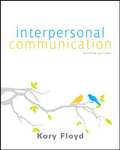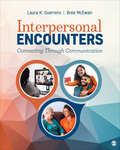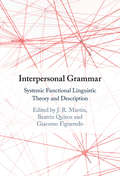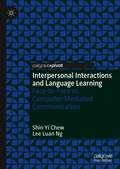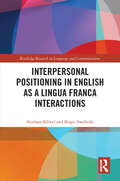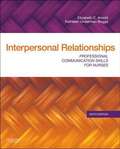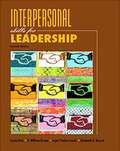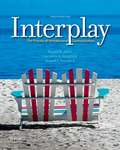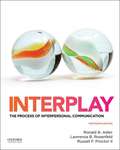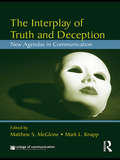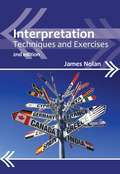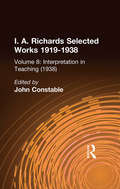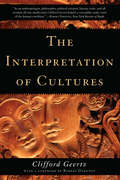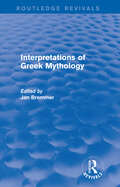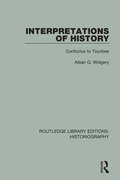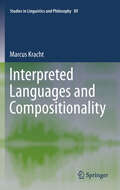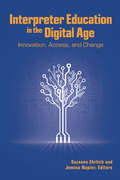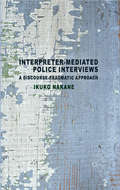- Table View
- List View
Interpersonal Communication (Second Edition)
by Kory FloydKory Floyd's approach to interpersonal communication stems from his research on the positive impact of communication on our health and well-being. Interpersonal Communication, 2e demonstrates how effective interpersonal communication can make students' lives better. With careful consideration given to the impact of computer-mediated communication, the program reflects the rapid changes of the modern world in which today's students live and interact. The program also helps students understand and build interpersonal skills and choices for their academic, personal, and professional lives.
Interpersonal Encounters: Connecting Through Communication
by Laura K. Guerrero Bree McEwanWith a practical and innovative approach, Interpersonal Encounters: Connecting through Communication shows students how interpersonal communication skills can be best used to accomplish everyday relationship goals. Guided by current interpersonal research from diverse authors and study participants, Laura K. Guerrero and Bree McEwan focus on the functions of interpersonal communication in our everyday lives and demonstrate how concepts, theories, and contemporary research apply to building, maintaining, and ending relationships. The book’s unique structure prepares students to become better communicators in their personal and professional lives. This title is accompanied by a complete teaching and learning package. Digital Option / Courseware SAGE Vantage is an intuitive digital platform that delivers this text’s content and course materials in a learning experience that offers auto-graded assignments and interactive multimedia tools, all carefully designed to ignite student engagement and drive critical thinking. Built with you and your students in mind, it offers simple course set-up and enables students to better prepare for class. Assignable Video with Assessment Assignable video (available with SAGE Vantage) is tied to learning objectives and curated exclusively for this text to bring concepts to life. LMS Cartridge: Import this title’s instructor resources into your school’s learning management system (LMS) and save time. Don’t use an LMS? You can still access all of the same online resources for this title via the password-protected Instructor Resource Site.
Interpersonal Encounters: Connecting Through Communication
by Laura K. Guerrero Bree McEwanWith a practical and innovative approach, Interpersonal Encounters: Connecting through Communication shows students how interpersonal communication skills can be best used to accomplish everyday relationship goals. Guided by current interpersonal research from diverse authors and study participants, Laura K. Guerrero and Bree McEwan focus on the functions of interpersonal communication in our everyday lives and demonstrate how concepts, theories, and contemporary research apply to building, maintaining, and ending relationships. The book’s unique structure prepares students to become better communicators in their personal and professional lives. This title is accompanied by a complete teaching and learning package. Digital Option / Courseware SAGE Vantage is an intuitive digital platform that delivers this text’s content and course materials in a learning experience that offers auto-graded assignments and interactive multimedia tools, all carefully designed to ignite student engagement and drive critical thinking. Built with you and your students in mind, it offers simple course set-up and enables students to better prepare for class. Assignable Video with Assessment Assignable video (available with SAGE Vantage) is tied to learning objectives and curated exclusively for this text to bring concepts to life. LMS Cartridge: Import this title’s instructor resources into your school’s learning management system (LMS) and save time. Don’t use an LMS? You can still access all of the same online resources for this title via the password-protected Instructor Resource Site.
Interpersonal Grammar: Systemic Functional Linguistic Theory and Description
by J. R. Martin Beatriz Quiroz Giacomo FigueredoThis pioneering volume lays out a set of methodological principles to guide the description of interpersonal grammar in different languages. It compares interpersonal systems and structures across a range of world languages, showing how discourse, interpersonal relationships between the speakers, and the purpose of their communication, all play a role in shaping the grammatical structures used in interaction. Following an introduction setting out these principles, each chapter focuses on a particular language - Khorchin Mongolian, Mandarin, Tagalog, Pitjantjatjara, Spanish, Brazilian Portuguese, British Sign Language and Scottish Gaelic – and explores mood, polarity, tagging, vocation, assessment and comment systems. The book provides a model for functional grammatical description that can be used to inform work on system and structure across languages as a foundation for functional language typology.
Interpersonal Interactions and Language Learning: Face-to-Face vs. Computer-Mediated Communication
by Shin Yi Chew Lee Luan NgThis book takes as its starting point the assumption that interpersonal communication is a crucial aspect of successful language learning. Following an examination of different communicative models, the authors focus on traditional face-to-face (F2F) interactions, before going on to compare these with the forms of computer-mediated communication (CMC) enabled by recent developments in educational technology. They also address the question of individual differences, particularly learners' preferred participation styles, and explore how F2F and CMC formats might impact learners differently. This book will be of interest to students and scholars of computer-mediated communication (CMC), computer-assisted language learning (CALL), technology-enhanced language learning (TELL), language acquisition and language education more broadly.
Interpersonal Messages: Communication and Relationship Skills (2nd edition)
by Joseph A. DevitoUpdated in a new 2nd edition, Interpersonal Messages stresses the importance of politeness, cultural awareness and ethical principles within daily interpersonal interactions by engaging students with its lively and accessible insight to interpersonal skill development. By creating a foundation for the reader,Interpersonal Messages gives room to understand the concepts of interpersonal communication and to develop the skills necessary to apply what they've learned. With a focus on skill-building, this book helps the reader to understand how to master interpersonal communication and relationship skills.
Interpersonal Positioning in English as a Lingua Franca Interactions (Routledge Research in Language and Communication)
by Svitlana Klötzl Birgit SwobodaThis book offers a critical reflection on interpersonal positioning across both large- and small-scale contexts and highlights the multi-faceted nature of intercultural communication in today’s global world. The volume establishes positioning primarily as the negotiation of interpersonal relationships, and draws on concepts from across disciplines by way of reappraisal before applying them to two specific domains: MMORPGs (Massively Multiplayer Online Role-Playing Games) and private ELF couple interaction. While acknowledging and showcasing the unique features of positioning in these two contexts, Klötzl and Swoboda point to their commonalities by looking at how language and specifically English is used as a communicative resource in lingua franca situations. The book also identifies new directions for future methodological innovations in that it demonstrates how the same interaction can be looked at in methodologically-different ways and how the authors’ own positions projected on to such interaction create an integrated tri-partite perspective on the two domains. Shedding light on interpersonal positioning in different contexts and in turn on global communication more generally, this book will be of particular interest to students and researchers in discourse analysis, pragmatics, computer-mediated communication, sociolinguistics, and applied linguistics.
Interpersonal Positioning in English as a Lingua Franca Interactions (Routledge Research in Language and Communication)
by Svitlana Klötzl Birgit SwobodaThis book offers a critical reflection on interpersonal positioning across both large- and small-scale contexts and highlights the multi-faceted nature of intercultural communication in today’s global world. The volume establishes positioning primarily as the negotiation of interpersonal relationships, and draws on concepts from across disciplines by way of reappraisal before applying them to two specific domains: MMORPGs (Massively Multiplayer Online Role-Playing Games) and private ELF couple interaction. While acknowledging and showcasing the unique features of positioning in these two contexts, Klötzl and Swoboda point to their commonalities by looking at how language and specifically English is used as a communicative resource in lingua franca situations. The book also identifies new directions for future methodological innovations in that it demonstrates how the same interaction can be looked at in methodologically-different ways and how the authors’ own positions projected on to such interaction create an integrated tri-partite perspective on the two domains. Shedding light on interpersonal positioning in different contexts and in turn on global communication more generally, this book will be of particular interest to students and researchers in discourse analysis, pragmatics, computer-mediated communication, sociolinguistics, and applied linguistics.
An Interpersonal Pragmatic Study of Professional Identity Construction in Chinese Televised Debating Discourse
by Chengtuan LiThis book explores debaters’ professional identity construction through implicit negation in televised debates from an interpersonal pragmatic perspective. It reveals the linguistic strategies used to indirectly negate the identity of others, and highlights three pairs of professional identity constructed through implicit negation: (1) expert vs. non-expert identity, (2) outsider vs. insider identity, (3) authentic vs. false identity. Furthermore, it proposes the Inter-relationality Principle, self-through-other identity and other-through-self identity, which contribute to Bucholtz and Hall’s theory of identity construction. Lastly, the book discusses the relations between professional identity construction through implicit negation and im/politeness, and builds a model of professional identity construction through implicit negation based on interpersonal pragmatics. By focusing on the interpersonal pragmatics of professional identity construction, the book advances the interpersonal pragmatic study of identity construction, im/politeness and implicit negation. As such, it is a valuable resource for a broad readership, including graduate students, and scholars who are interested in professional identity construction, implicit negation and im/politeness research.
Interpersonal Relationships: Professional Communication Skills for Nurses
by Elizabeth C. Arnold Rn Pmhcns-Bc Kathleen Underman Boggs Fnp-CsEffective communication with clients, families, and professional colleagues starts here! With Interpersonal Relationships: Professional Communication Skills for Nurses, 7th Edition, you'll see how good communication skills can lead to achieving treatment goals in health care. Clear guidelines show how you can enhance the nurse-client relationship through proven communication strategies as well as principles drawn from nursing, psychology, and related theoretical frameworks. And you'll see how to apply theory to real-life practice with case studies, interactive exercises, and evidence-based practice studies. A two-time winner of the AJN Book of the Year award, this book is updated to emphasize interdisciplinary communication and QSEN competencies. From expert nursing educators Elizabeth Arnold and Kathleen Underman Boggs, this comprehensive, market-leading text is unmatched for helping nurses develop effective communication skills! Interactive exercises offer the opportunity to practice, observe, and critically evaluate your professional communication skills in a safe learning environment. Practical guidelines describe how to modify communications strategies for various populations and situations including children, the elderly, end of life, clients with special needs, health teaching, stress, crisis, and professional colleagues. Case examples help you develop empathy for clients' perspectives and needs. Nursing, behavioral, developmental, family, and communication theories provide an essential foundation and a theoretical perspective for effective communication. Learning objectives, chapter overviews, and a detailed glossary focus your study and help you absorb and retain key content. NEW! A greater emphasis on communication, interdisciplinary theory, and interprofessionalism includes a focus on the nursing paradigm, nursing discipline, and ways of knowing. NEW! Focus on QSEN competencies reflects current thinking on technology, safety, and evidence-based practice, especially as they relate to communication in nursing. NEW! Discussion questions at the end of each chapter encourage critical thinking. NEW! Clarity and Safety in Communication chapter addresses topics such as huddles, rounds, handoffs, SBAR, and other forms of communication in health care.
Interpersonal Skills For Leadership
by Susan Fritz William Brown Joyce Lunde Elizabeth BansetFor courses in interpersonal skills, communication, leadership development, or service learning in Business Studies departments. This practical resource provides an introduction to interpersonal skills theories which are reinforced through experiential activities. Coverage focuses on the development of the basic interpersonal skills necessary to command one's own life, relate well to other people and to lead others in positive directions.
Interplay: The Process of Interpersonal Communication (12th Edition)
by Ronald B. Adler Lawrence B. Rosenfeld Russell F. ProctorWith its unique blend of compelling topics and rich pedagogy, the twelfth edition of Interplay shows how scholarship, research, and theory can introduce students to communication and help them understand their own relationships in everyday life. New to this edition:The most extensive use of current research of any interpersonal book on the market: 1,512 total sources, of which 514 are new (34% more than the previous edition)Chapter 2, "Interpersonal Communication in a Changing World: Culture and Social Networking," includes the latest coverage of social media's impact on interpersonal relationships. Chapter 12, "Interpersonal Contexts" includes a new discussion of communication in friendships and updated sections on communication in intimate relationships and family"At Work" boxes in every chapter help readers apply scholarship to their careers"Media Clips" now use both television and films to illustrate communication concepts.
Interplay: The Process of Interpersonal Communication
by Ronald Adler Lawrence Rosenfeld Russell ProctorWith its unique blend of compelling topics and rich pedagogy, the thirteenth edition of Interplay: The Process of Interpersonal Communication offers a perfect balance of theory and application to help students understand and improve their own relationships. Interplay's inviting visual format and rich pedagogy continue to make this text the market leader in Interpersonal Communication.
The Interplay of Truth and Deception: New Agendas in Theory and Research (New Agendas in Communication Series)
by Matthew S. McGlone Mark L. KnappDuring the past 30 years, there have been a steadily increasing number of scientific and popular publications dealing with lying and deception. Questions about the extent to which public officials are deceptive are standard fare in current magazines and newspapers. This volume aims to present on a more precise conceptualization of this phenomenon, manifested in some well-known constructions like spin, hype, doublespeak, equivocation, and contextomy (quoting out of context). The contents of the volume have been generated for the New Agendas symposium at the University of Texas College of Communication, and all the authors are young, leading-edge researchers offering innovative perspectives and explorations of lying and deception in various contexts. This volume will appeal to scholars, researchers, and advanced/graduate students in communication, media, and psychology. It is written to the level of advanced undergraduates, and it is appropriate for use in courses covering lying and deception.
Interpretation: Making A Difference On Purpose
by Sam H. HamIn the new edition of the international bestseller Environmental Interpretation, Sam H. Ham captures what has changed in our understanding of interpretation during the past two decades. Ham draws on recent advances in communication research to unveil a fresh and invigorating perspective that will lead interpreters to new and insightful pathways for making a difference on purpose through their work.
Interpretation
by James NolanIn recent decades the explosive growth of globalization and regional integration has fuelled parallel growth in multilingual conferences. Although conference interpreting has come of age as a profession, interpreter training programs have had varied success, pointing to the need for an instructional manual which covers the subject comprehensively. This book seeks to fill that need by providing a structured syllabus and an overview of interpretation accompanied by exercises in various aspects of the art. It is meant to serve as a practical guide for interpreters and as a complement to interpreter training programs in the classroom and online, particularly those for students preparing for conference interpreting in international governmental and business settings. This expanded second edition includes additional exercises and provides direct links to a variety of web-based resources and practice speeches, also including additional language combinations.
Interpretation In Teaching V 8
by John Constable I. A. RichardsPart of the Selected Works by I.A. Richards 1919-1938, Volume 8 out of ten, focuses on the interpretation in teaching from 1938. The earliest work towards Interpretation in Teaching dates from 1928. With Practical Criticism substantially completed Richards was planning revisions to his courses and new directions to his writing, which was increasingly moving away from the subject of poetry.
The Interpretation of Cultures
by Clifford Geertz Robert DarntonIn The Interpretation of Cultures, the most original anthropologist of his generation moved far beyond the traditional confines of his discipline to develop an important new concept of culture. This groundbreaking book, winner of the 1974 Sorokin Award of the American Sociological Association, helped define for an entire generation of anthropologists what their field is ultimately about.
The Interpretation of Fairy Tales: Revised Edition
by Marie-Louise von FranzOf the various types of mythological literature, fairy tales are the simplest and purest expressions of the collective unconscious and thus offer the clearest understanding of the basic patterns of the human psyche. Every people or nation has its own way of experiencing this psychic reality, and so a study of the world's fairy tales yields a wealth of insights into the archetypal experiences of humankind.Perhaps the foremost authority on the psychological interpretation of fairy tales is Marie-Louise von Franz. In this book—originally published as An Introduction to the Interpretation of Fairy Tales —she describes the steps involved in analyzing and illustrates them with a variety of European tales, from "Beauty and the Beast" to "The Robber Bridegroom."Dr. von Franz begins with a history of the study of fairy tales and the various theories of interpretation. By way of illustration she presents a detailed examination of a simple Grimm's tale, "The Three Feathers," followed by a comprehensive discussion of motifs related to Jung's concept of the shadow, the anima, and the animus. This revised edition has been corrected and updated by the author.
The Interpretation of Samuel Johnson (Studies In Modern History Ser.)
by Howard Erskine-Hill Jonathan ClarkA major academic controversy has raged in recent years over the analysis of the political and religious commitments of Samuel Johnson, the most commanding of the 'commanding heights' of eighteenth-century English letters. This book, one of a trilogy from Palgrave, brings that debate to a decisive conclusion, retrieving the 'historic Johnson' as opposed to the 'usable Johnson' that had been devised in the early twentieth century. The trilogy makes untenable the old picture of a Johnson who was Olympian, detached from the conflicts of his age, a timeless moralist. It reinstates a man well-informed about and deeply committed to the conflicts of his era in Church and State, in theology and in political ideology. And instead of a timeless, unchanging Johnson, it offers a picture of a man whose views importantly developed over the course of his agonized lifetime.
Interpretations of Greek Mythology (Routledge Revivals)
by Jan N. BremmerInterpretations of Greek Mythology, first published in1987, builds on the innovative work of Walter Burkert and the ‘Paris school’ of Jean-Pierre Vernant, and represents a renewal of interpretation of Greek mythology. The contributors to this volume present a variety of approaches to the Greek myths, all of which eschew a monolithic or exclusively structuralist hermeneutic method. Specifically, the notion that mythology can simply be read as a primitive mode of narrative history is rejected, with emphasis instead being placed on the relationships between mythology and history, ritual and political genealogy. The essays concentrate on some of the best known characters and themes – Oedipus, Orpheus, Narcissus – reflecting the complexity and fascination of the Greek imagination. The volume will long remain an indispensable tool for the study of Greek mythology, and it is of great interest to anyone interested in the development of Greek culture and civilisation and the nature of myth.
Interpretations of History: From Confucius to Toynbee (Routledge Library Editions: Historiography)
by Alban G. WidgeryIn this volume, originally published in 1961, the author presents an exposition of the meanings given to history. Part 1 describes the conceptions of history impied in wide-spread religions and cultures, Confucian and Taoist, Hindu and Buddhist, Zoroastrian and Muslim, Greek and Roman, Jewish and Christian. Part 2 surveys the theories of independent thinkers and schools in the Occident from the Middle Ages to the mid-twentieth century.
Interpreted Languages and Compositionality
by Marcus KrachtThis book argues that languages are composed of sets of 'signs', rather than 'strings'. This notion, first posited by de Saussure in the early 20th century, has for decades been neglected by linguists, particularly following Chomsky's heavy critiques of the 1950s. Yet since the emergence of formal semantics in the 1970s, the issue of compositionality has gained traction in the theoretical debate, becoming a selling point for linguistic theories. Yet the concept of 'compositionality' itself remains ill-defined, an issue this book addresses. Positioning compositionality as a cornerstone in linguistic theory, it argues that, contrary to widely held beliefs, there exist non-compositional languages, which shows that the concept of compositionality has empirical content. The author asserts that the existence of syntactic structure can flow from the fact that a compositional grammar cannot be delivered without prior agreement on the syntactic structure of the constituents.
Interpreter Education in the Digital Age: Innovation, Access, and Change
by Jemina Napier Suzanne EhrlichThis collection brings together innovative research and approaches for blended learning using digital technology in interpreter education for signed and spoken languages. Volume editors Suzanne Ehrlich and Jemina Napier call upon the expertise of 21 experts, including themselves, to report on the current technology used to provide digital enhancements to interpreter education in Australia, New Zealand, Brazil, Belgium, the United Kingdom, and the United States. Divided into three parts, Innovation, Change, and Community Engagement, this study focuses on the technology itself, rather than how technology enhances curriculum, delivery, or resources. Initiatives described in this collection range from the implementation of on-demand interpreting using iPad technology to create personalized, small-group, multidimensional models suited to digital media for 160 languages; introducing students to interpreting in a 3D world through an IVY virtual environment; applying gaming principles to interpreter education; assessing the amenability of the digital pen in the hybrid mode of interpreting; developing multimedia content for both open access and structured interpreter education environments; to preparing interpreting students for interactions in social media forums, and more. Interpreter Education in the Digital Age provides a context for the application of technologies in interpreter education from an international viewpoint across languages and modalities.
Interpreter-mediated Police Interviews: A Discourse-Pragmatic Approach
by I. NakaneThis book shows how participation of interpreters as mediators changes the dynamics of police interviews, particularly with regard to power struggles and competing versions of events. The analysis of interaction offers insights into language in the legal process.
